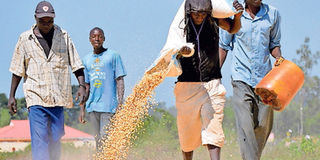Agriculture funding low for food security

Agriculture and economic experts have noted that it may be difficult to achieve food security priority in the Big Four Agenda with the underfunding of the sector. FILE PHOTO | NMG
What you need to know:
- The government recently announced measures under the Big Four Agenda towards boosting the country’s food security by heavily investing in agriculture, but analysts note its financial commitment in the recently announced budget remain too meagre to deliver the promise.
- A lot of money in the current budget for instance has been directed to fund research, yet extension services which are very critical in linking farmers and research has been forgotten.
- Experts also suggested the government should put emphasis on community-based irrigation schemes, instead of large-scale and expensive irrigation schemes like Galana-Kulalu which are yet to benefit the country.
Sometime in the 80s, Kenya had a small population of about 20 million people. Its budgetary allocation towards food security and agriculture those days was 11.2 per cent, a figure above the 10 per cent minimum threshold.
With time, however, allocation towards agriculture plummeted that by 2001, they hit below five per cent. In the last five years, they have stagnated at three per cent.
The government recently announced measures under the Big Four Agenda towards boosting the country’s food security by heavily investing in agriculture, but analysts note its financial commitment in the recently announced budget remain too meagre to deliver the promise.
Just like in the previous years, agriculture was allocated a paltry 3.5 per cent of the national government expenditure, 6.5 percent shy of the required minimum.
Agriculture and economic experts have noted that it may be difficult to achieve food security priority in the Big Four Agenda with the underfunding of the sector.
Dr Alex Awiti, the Director East Africa Institute, Aga Khan University, says that the paltry budgetary allocation makes the quest to be food secure a pipe dream unless necessary incentives and policy intervention are urgently put in place.
He noted that the food production sector is undercapitalised making people run away from small-holder farming.
LOW FUNDING FIOR EXTENSION SERVICES
“The 3.5 per cent is way too low below the African Union member states commitment known as the Maputo Declaration of 2003 to allocate 10 per cent of government expenditures to agriculture and rural development,” he said, adding the commitment was reiterated with the Malabo Declaration of 2014.
“A lot of money in the current budget for instance has been directed to fund research, yet extension services which are very critical in linking farmers and research has been forgotten. How will farmers access this research finding or technologies in the absence of extension service providers?” Dr Awiti posed during a post-budget analysis forum by Route to Food Initiative, an NGO.
Alexander Owino, a financial sector specialist, noted the 2018/2019 budget looked at food production without addressing post-harvest losses, cost of farm inputs, extensions services and low technology intervention for farmers.
He said that processing cannot be achieved without surplus food production.
Experts also suggested the government should put emphasis on community-based irrigation schemes, instead of large-scale and expensive irrigation schemes like Galana-Kulalu which are yet to benefit the country.
Irrigation was allocated Sh8.5 billion in the budget.
Benard Moseti, a research coordinator and policy analyst at Route to Food Initiative, noted that the country’s budget making process is top bottom and does not take account on the views of the farmers.
“Manufacturers have been allowed to import pesticides into the country at duty free rate, without a caveat on to when the importation should stop, which disempowers local manufacturers,” said Moseti.





